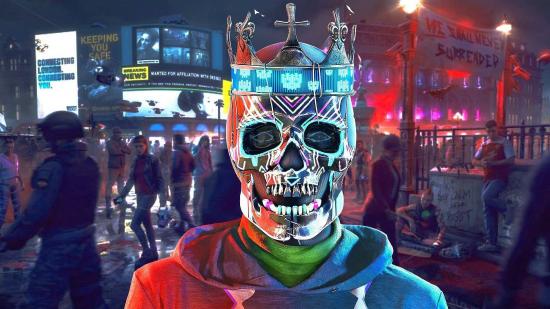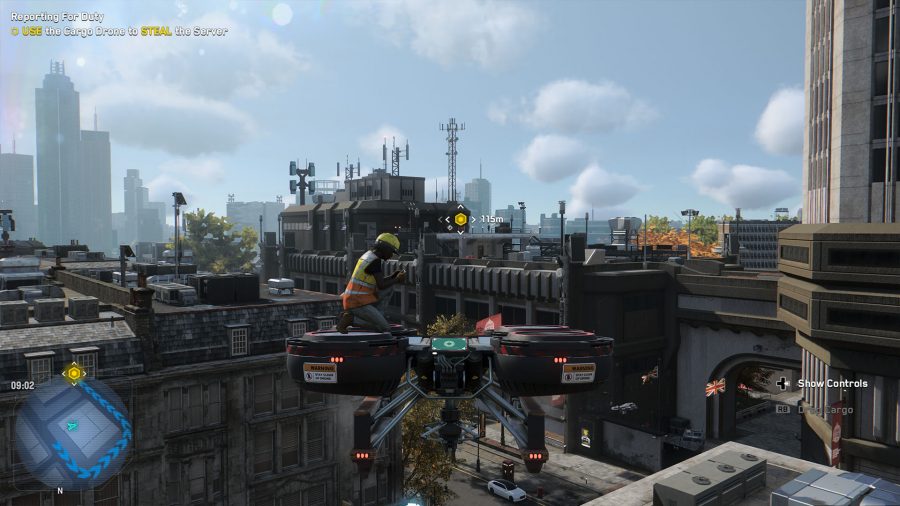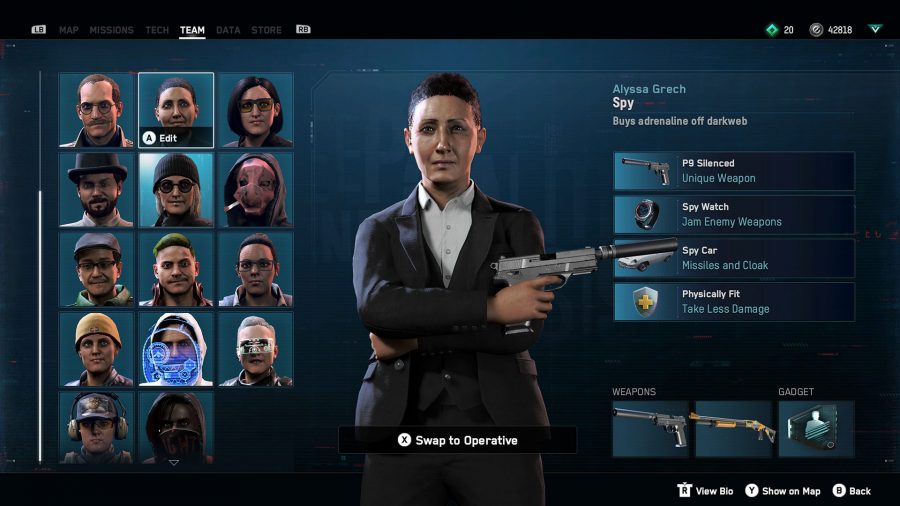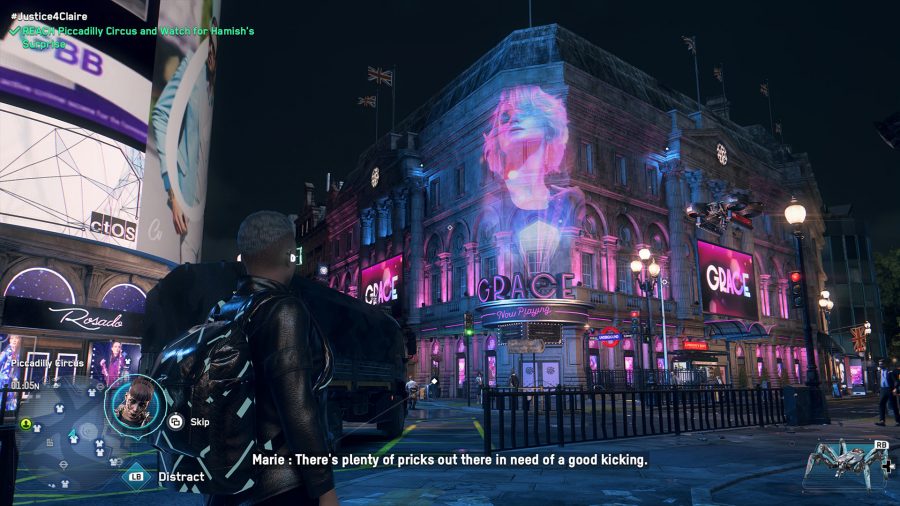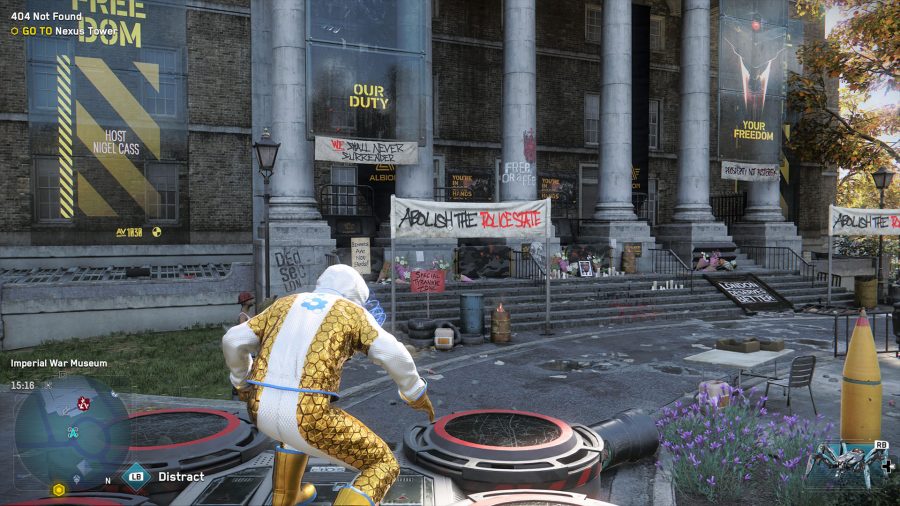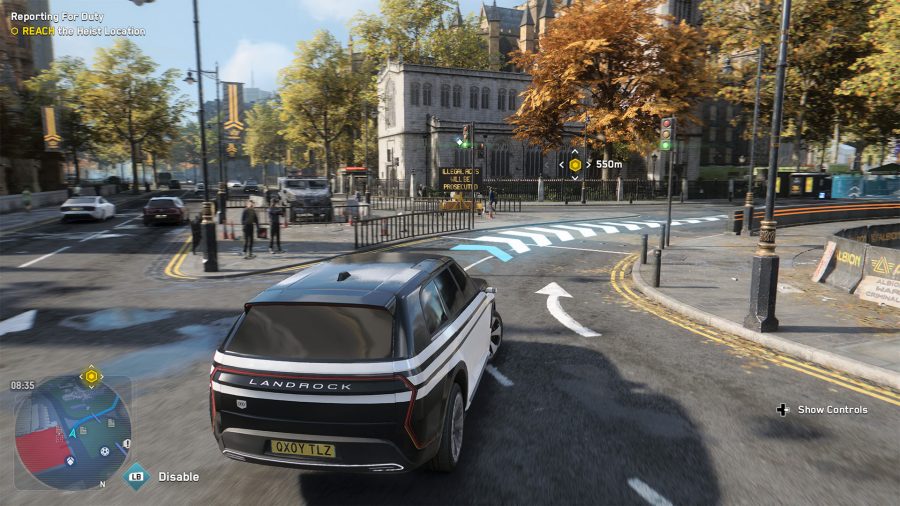Our Verdict
Richly realised systems and empowering abilities create a tremendously fun sandbox to dig into, but another toothless story ensures these flashes of brilliance never cohere, leaving Legion feeling less than the sum of its parts.
It’s early in my time with Watch Dogs Legion, and I’m trying to grab a collectable from a rooftop. There’s a complex series of vents, ledges, and jumpable gaps, and I’m having a rough time figuring out the intended path.
Then I see a cargo drone nearby – you can hack and remotely control any drone in the game – which looks just big enough for me to climb on. ‘No – surely this is too easy?’ I think. But then I climb on that drone, hack its controls, and fly it straight up to the item I want to collect. I feel like I’ve broken the game, and found some unintended secret technique that’s about to let me bypass every exploration and stealth challenge the game will put before me.
This turns out to be roughly accurate, but it also turns out to be intentional. A few missions later, Watch Dogs Legion explicitly tells me how to ride cargo drones in a scripted tutorial. It goes on to spend the next twenty hours giving me dozens more abilities, each one upsetting the game balance more than the last, which collectively make an absolute mockery of nearly every supposedly difficult thing I’m asked to do.
Watch Dogs Legion both dares and invites you to break it. The latest in Ubisoft’s tech-focused open-world series can once again be reductively described as ‘GTA but with hacking abilities’, yet those hacks are now so powerful that it feels more like ‘GTA but with cheats turned on’. Don’t feel like endangering your life by sneaking into an enemy stronghold? Just toss in a spider drone – it can get the job done as well as you can, and if it gets destroyed, there’s always another.
The ‘Legion’ part of Watch Dogs Legion comes with your cast of playable characters. You can recruit any person you meet on the street into your gang of hackers and then play as them, enjoying their particular set of special abilities and a bit of procedurally generated backstory. You might be able to recruit an investment banker with a summonable sports car, or a medical worker who can stroll straight into secure hospital facilities.
For the most part, though, you won’t actually want to recruit people off the street. The recruitment missions take just long enough to be a bit of a hassle, and you’ll only want to take the time for the exceptional characters with multiple abilities. These will occasionally pop up as waypoints on your map, or you can get them by finishing all three of the big activities in each of London’s boroughs.
The varied skillsets you can bring into your roster have the effect of letting you choose which type of game you want to play before every mission. Do you want a pure, Metal Gear-style stealth game? Choose your spy, equipped with a silenced pistol and stealth bonuses. How about Hitman-style costume stealth? You can get into hospitals or construction sites if you’re the appropriate type of worker. Want to go full John Wick? An assassin will be loaded up with assault weapons and gets an instant melee takedown with the gunkata ability. Or perhaps you’d like to conquer an entire stronghold without even entering it? A drone expert can summon an infinite supply of taser-equipped flying robots to do just that.
All these options feel powerful, richly realised, and thoroughly enjoyable to use, and the variety of potential approaches helps compensate for how repetitive your objectives tend to be – nearly everything is resolved by getting either yourself or a drone to a hackable object in a secured area. Legion is dedicated to its sandbox, and in that sense it’s one of the purest open-world games I’ve played in ages. You aren’t going to screw up a scripted story mission by getting too creative – more likely, the designers have prepared for you to do that thing, and like your favourite tabletop dungeon masters, have given a knowing nod and said ‘yeah, sure, go for it’.
Related: Check out the best RPG games on PC
Legion feels like a return to an older, leaner style of open-world game, which in a sense complements the epic scale of modern Assassin’s Creed in Ubisoft’s stable. Legion’s vision of London is not packed with a dozen varieties of checklist collectables – there are simply upgrade points and narrative objects directly relevant to the location you’re in. There’s no massive skill tree, but rather a few abilities and gadgets to unlock, each of which can be upgraded twice. There are no loot drops or damage numbers. This is an action game, not an RPG, and headshots kill unarmoured enemies whether you’re in the first mission or the final encounter.
There isn’t a ton of traditional side content or mini-games, either. There’s stuff to do outside of the story, sure, but it all engages with those core systems that make hacking your way through fortified areas so satisfying. Each London borough has three objectives to complete, and doing them will reveal the location of upgrade points on your map. That’s it. No towers to climb, and no points of interest to unlock. This is not a dig about a lack of content – on the contrary, it’s a delight to play an open-world game that centres on the best points of its own design.
London is gorgeous, too, and the different districts feel distinct from one another, from the architecture to the people (and accents) you find on the street. Big, old cities always have a dichotomy between their historic buildings and modern constructions, and Legion’s near-future dystopia makes that contrast even more striking. Police billboards on the side of Tower Bridge and massive holographic ads above bars in the older sections of town do a lot to sell the setting, even if the protest graffiti you find here and there usually feels a bit too on-the-nose.
We’re this deep into the review and I still haven’t managed to say anything about the story – because, frankly, all there is to say is how little it matters. It seemed poised to end it, but Watch Dogs Legion sadly continues Ubisoft’s tradition of spinning toothless yarns from current headlines. While Legion’s dystopian London hews closer to modern events than most of the publisher’s other titles, it still can’t commit to doing anything interesting with the concepts it brings up, or saying anything more sophisticated or controversial than ‘oppression is bad’.
Legion puts us in a version of London so consumed by paranoia that its politicians have willingly submitted the city to nonstop surveillance by a private security company. What stoked that paranoia? Well, you’re gonna get a vague reference to a refugee crisis, but best not to ask many questions beyond that. All you need to know now is that the Big Brother is bad, and to stop the surveillance you just need to take down the series of cartoonishly evil villains that are now running the town.
The game constantly teeters on the edge of having something to say, like when you hear a podcast host ask how we can dehumanise immigrants by calling them ‘illegals’, but before anyone actually elaborates on that thought, it’s time to restore power to the people by hacking another absurdly villainous interest. Why did anybody support the uber-police in the first place? Your group gets framed for a series of bombings in the opening mission, but this doesn’t explain the city’s pre-existing support for the surveillance state, nor why the whole of London will be happy to turn to your cause as soon as you do something as trivial as hack some digital graffiti onto the city’s billboards.
Even if you’re not coming in expecting Watch Dogs Legion to deliver a meaningful fictional account of post-Brexit London – and I sure hope you’re not – the awkward lack of narrative consequence keeps the story from working on its fictional merits, either. That’s compounded by the procedural generation of your limitless playable cast – most cutscenes have your current character simply stand nearby as a villain and a non-playable hero with an actual script play out the scene. There’s an amazing amount of voice acting to ensure that your character is able to chime in during these scenes, but they will never have a personal connection to the other characters, so their contributions are always superficial and always fall flat.
Related: Check out the best cyberpunk games on PC
All that voice acting and procgen backstory does create at least some memorable characters beyond the main plot. Take my spy, for example: think James Bond as portrayed by Jason Statham, if Jason Statham were a 48-year-old woman. Dressed in a suit and equipped with a fancy watch that disables enemy weapons, she’s the epitome of style and class, until she opens her mouth and starts growling about the ‘wankstains’ she’s fighting. She’s wonderful.
When you’re playing a character you like and finding new ways to outsmart the game, Legion feels so satisfying. It’s a series of Deus Ex levels chopped into bite-sized pieces, as each building you infiltrate presents a new puzzle and a chance to consider your exciting toolbox afresh. All those tools are equally valid, and even if you fail at one attempt by getting hospitalised or arrested, your character is just going to be out of play for an hour, which means plenty of time to try out a new approach.
Watch Dogs Legion is made up of these fabulous sandbox systems that create memorable characters and give you a tremendous amount of freedom to simply play around. But those systems serve a frustratingly underutilised setting, and can’t build on their own to a satisfying payoff. It’s brilliant in bursts, but it all ends up feeling a bit frivolous.
